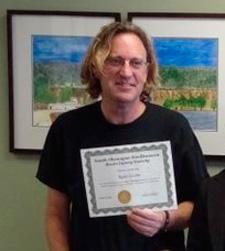More than a decade after three gaybashers were acquitted of breaking into his Osoyoos home to attack him, Brian Coutts sees few signs of progress in the BC court system.
The 1995 home invasion, described by a judge as “brutal and terrifying,” saw three men smash in a door and attack Coutts and his then-partner, Randall Lampreau, with a tire iron, causing head injuries.
Earlier in the evening of the assault, a group of men had made homophobic remarks to the couple and their friends at a bar.
At the subsequent criminal trial, Anton Svedruzic, David Hung Quoc Truong and John Huan Quoc Truong were acquitted due to identification insufficiencies and lack of evidence.
The RCMP faced criticism for its handling of the case, including the absence of a lineup to identify the attackers.
Court records state that expert reports on the victims’ injuries were also not obtained because of “lack of finances.”
So Coutts and Lampreau pursued civil action.
In 2000, the civil division of the BC Supreme Court in Penticton found Svedruzic and the Truongs responsible for the attack and awarded Coutts and Lampreau $53,500 and $30,000 respectively for physical, emotional and financial damages.
But Coutts, now 51 and living in Penticton, has yet to receive any of the money he was awarded.
He tells Xtra he cannot afford the legal and court fees required to pursue the payment.
“It’s not a lot of money for my life,” Coutts says of the award, but adds the civil outcome has been the “only salvation” after the criminal trial.
“In the courtroom they were asking two people with head injuries: ‘Do you remember this?’, ‘Do you remember that?’ when we couldn’t remember if we’d tied our shoelaces that morning,” he recalls.
He says he still experiences symptoms such as memory loss, nightmares, anxiety and depression. He has not held paid employment since the attack.
“Even the simplest of tasks, like watching a movie on TV, will cause me severe mental fatigue,” Coutts says.
“I lost a lot of friends and family. I lost a lot of everything because of this.
“They took away my life. I can’t remember who I was before without people telling me. So many memories are gone.”
Lampreau died in June 2008. According to court records from the civil case, the attackers struck him “violently” on the head and face with the iron bar. Lampreau needed 10 stitches and experienced headaches, memory problems and emotional changes after the assault.
The Osoyoos attack occurred a year before the hate crime designation was enacted in the sentencing section of Canada’s Criminal Code. BC judges have since applied the designation to four gaybashings, including two this year.
Although Coutts believes the sentencing provision — which increases penalties for crimes motivated by homophobia — helps highlight bullying and intolerance, he questions its impact in the courtroom and the real world, particularly in smaller communities.
“In a big city, maybe it helps. Outside of major cities in Canada, no,” he says.
“I know a lot of gay youth here [in Penticton] who are terrified to come out because they’ll be treated so badly. Do you think they care that there’s a ‘hate crime’ category out there?
“Even 15 years later I think there’s still a lot of bias in the courts and a lot of ignorance with the police. In my case alone, all three of the people would still be in jail if the police had done their job.”
Cpl Mike Field, of the RCMP’s Oliver/Osoyoos detachment, says he is unable to comment specifically on the case because records were purged after eight years, in line with administrative procedures at the time.
He adds, “If this incident were to happen today, and it met the classification for a hate crime, then [the file] would be held longer. Unfortunately, the hate crime classification did not exist in 1995.
“Fortunately, we now recognize and track these types of offences, which has benefits for both public education and the criminal justice system, as judges may consider hate-motivated crimes as aggravating circumstances when they are making their judgments.”
Coutts tells Xtra he is determined to continue “the fight to find justice” by locating the three defendants to pursue payment of the civil award.
“I am imagining it’s probably going to cost $10,000 or more before I see the end of this thing and be able to put it behind me,” he says. “I can’t give up. It’s all I have.”

 Why you can trust Xtra
Why you can trust Xtra


